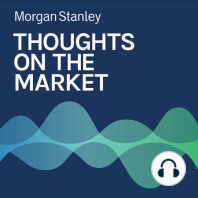3 min listen

Michael Zezas: U.S. & China - Unfinished Business
Michael Zezas: U.S. & China - Unfinished Business
ratings:
Length:
3 minutes
Released:
Jan 27, 2022
Format:
Podcast episode
Description
2022 is likely to bring fresh challenges for the U.S.-China dynamic. Investors can expect an increase in non-tariff barriers and continued commitment to re- and near-shoring of supply chains in the US.----- Transcript -----Welcome to Thoughts on the Market. I'm Michael Zezas, Head of Public Policy Research and Municipal Strategy for Morgan Stanley. Along with my colleagues, bringing you a variety of perspectives, I'll be talking about the intersection between U.S. public policy and financial markets. It's Wednesday, January 26th at 10:00 a.m. in New York. While the ongoing situation between the Ukraine and Russia remains an obvious geopolitical risk to pay attention to, we shouldn't lose sight of the ongoing developments in the relationship between the U.S. and China. There's plenty of reason to expect that, in 2022, the two countries’ economic relationship - perhaps the most consequential in the world - will face fresh challenges. From the US's perspective, there's unfinished business. For example, the 'phase one' trade deal, signed back in January of 2020, expired at the end of 2021, and the results fell short of the agreement. Per data from the Peterson Institute, China only purchased 62% of the manufactured products, 76% of the agricultural products and 47% of the energy products it had committed to. These stats likely won't change the perception of the American voter, where issue polls show a bipartisan consensus that the U.S. relationship with China continues to be a problematic one. And since 2022 is a midterm election year, don't expect U.S. policymakers to stand pat on the issue. So what can we expect? We've covered before how the U.S. has, and likely will continue, to raise non-tariff barriers with China - things like export controls around sensitive technologies and investment restrictions. These deployments will continue to make for a more challenging environment for U.S. companies seeking easy access to China's markets, either to sell or produce goods. But one thing you can also expect is fresh legislative action to invest in the US's capabilities in key industries and supply chains that have been declared essential for economic and national security purposes. For example, news broke this week that the U.S. House of Representatives was starting its work to advance the U.S. Innovation and Competition Act, or USICA. The bill passed the Senate last year with substantial bipartisan support and would spend over $200B on research in artificial intelligence, quantum computing and biotechnology, in addition to cultivating local supply chain sources for key tech needs, like rare earths. This dynamic underscores a trend we've been focused on for many years. The slow but steady re and near shoring of supply chains for U.S. companies. It's a key reason our colleagues in equity research continue to see an opportunity in the capital goods sector, calling for a 'generational capex cycle over the next several years, driven by supply chain investment'. So stay tuned. We'll keep tracking this trend and keep you informed. Thanks for listening. If you enjoy the show, please share Thoughts on the Market with a friend or colleague or leave us a review on Apple Podcasts. It helps more people find the show.
Released:
Jan 27, 2022
Format:
Podcast episode
Titles in the series (100)
Michael Zezas: Three Possible Trade Paths from the G20 by Thoughts on the Market